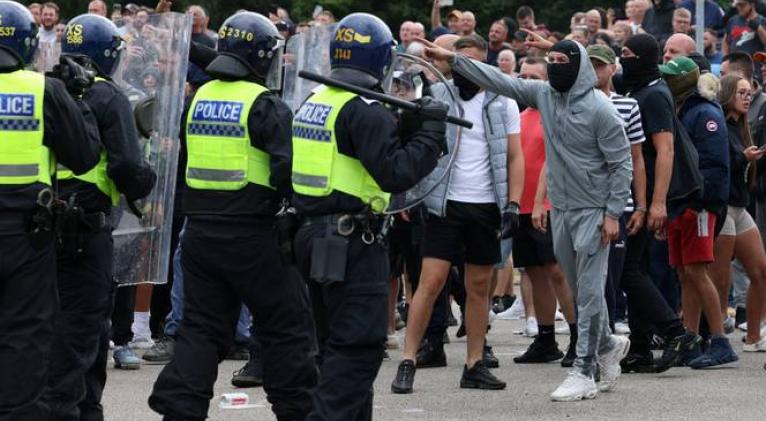'Islamophobia driving far-right riots in UK': Muslim Council leader
especiales

Britain reeled under the worst riots in 13 years as far-right vandals clashed with police, targeted mosques and looted stores following last week’s fatal stabbing of three children in Southport.
Prime Minister Keir Starmer has blamed “far-right thuggery” by a “tiny mindless minority” for the unrest that has gripped Liverpool, Lancaster, Leeds, Birmingham, Hull and Belfast, among other cities.
In order to quell rumours on social media that sparked the protests—that the attacker was a Muslim immigrant—a judge ordered that the suspect’s identity be revealed. “Continuing to prevent full reporting at this stage has the disadvantage of allowing others who are up to mischief to continue to spread misinformation in a vacuum,” said Liverpool judge Andrew Menary.
The suspect Axel Rudakubana—a teenager born in Cardiff to Rwandan parents—turned out to be neither Muslim nor a migrant to the UK.
British Muslims fear for safety amid far-right protests targeting mosques
Speaking to TRT World, Secretary-General of the Muslim Council of Britain Zara Mohammed says the situation is tense for Muslims in the UK.
“The anxiety and fear is palpable. Muslims had nothing to do with the murders in Southport, but they’re still attacking mosques. How does that make sense? I think it’s the hierarchy of racism where Muslims are not seen as important, and I think that’s the challenge,” she says.
Yet the misinformation campaigns linking the attacks to Muslims continued, and conservative talk show guests complained about the ‘Islamification of Britain,’ even after the suspect’s identity was revealed.
Some of the posts shared by these far-right groups and individuals on social media included slogans like: “We need our country back”, and “Enough is enough.”
“It’s both Islamophobic and anti-migrant rhetoric because they’re linked,” says Mohammed.
“They’re saying [Muslims] are not British. That we’re not part of this community, we’re coming from the outside to take over, creating criminality and threats. I think what's missing in some of the reporting on the riots is calling these attacks ‘Islamophobic’...Many Muslims feel that just because they're Muslim, nobody cares.”
On August 1, the MCB hosted a webinar on mosque security, with an appearance by Imam Ibrahim Hussein from Southport Mosque, who was inside the mosque when it was attacked on July 30.
“The mosque management has been very concerned about security measures regarding these far-right thugs breaking in and smashing windows and doors,” says Mohammed.
“But they’re also afraid of attacks on local community centres, shops, elderly programs, summer school classes. It’s quite terrifying, but we’ve told everyone to remain calm, work with the police and keep their congregations informed.”
Next month, the MCB will host a Visit My Mosque programme, inviting non-Muslims to visit places of worship to help clear misconceptions.
“It’s important to see it as a broad coalition of work that we all have to do. We have to keep challenging harmful narratives. We have to use mainstream media to channel our message, talk to our interfaith allies, and work with community groups,” says Mohammed.
She also believes there needs to be greater accountability regarding misinformation on social media.
“Politicians like Nigel Farage need to be taken to task and be made accountable for spreading fake news. I think what’s different this time around is that they’re using WhatsApp, Telegram, Facebook, and Twitter—and what’s so crazy and scary is how fast they’re able to gather. We’ve seen the rise of the far-right and Tommy Robinson-kind-of-figures, and while they’ve done these kinds of protests before, we’ve never seen anything as aggressive as it is now.”















Add new comment